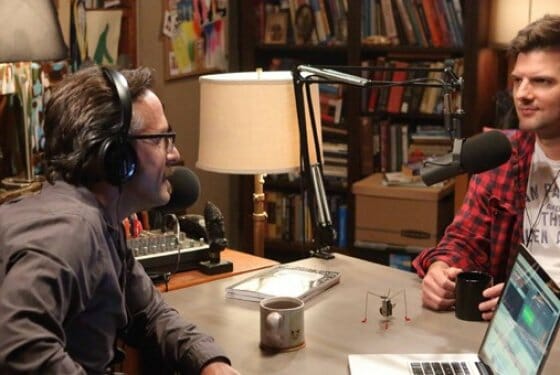Maron: “Projections”/”Mexican Angel” (Episodes 1.09/1.10)

“I love crazy.” – Marc Maron
There’s more to this line—part of Maron’s monologue that ends the first season of his show on IFC—but after 10 episodes with the comedian and podcast host, this is a fine place to start. Over the course of the show’s run, Maron has embraced the crazy—tracking down internet trolls, dallying with a dominatrices and dead possums, and witnessing a weekend sexfest turn into a real relationship. But, I think the season has taught us the “crazy” that Maron thinks he likes is a very particularly managed one. When the crazy gets crazy is when things really get going.
If we’ve gleaned anything about Maron the guy from Maron the character/persona/podcast host, it’s that he’s interested in maintaining control over what, for him, has been a highly effective personal (dis)order. As long as he remains in charge—perhaps most evident when he’s sitting in his garage hosting guests and guiding the WTF ship—he’s in command. The controls are as tightly regulated as his sobriety, really. And even though he’s often revealing his insecurities, he’s got the final cut. Things go how he says they should.
When the podcast ends and the garage door is shoved open, real life intervenes. His deadbeat dad shows up and forces him to confront the same feelings and repressed emotions he does for his listeners’ pleasure, but it’s more real, so he struggles with it. Other, ostensibly more successful figures in entertainment pop up as guests, challenging his (lack of) manhood, extended adolescence and anger issues. His assistant and girlfriend force him to take them seriously as adults. The “crazy” surreality Marc maintains is a house of cards—it’s carefully constructed but on shaky ground that can be easily disrupted either by his own imperfections or by the intrusions of others around him who force him out of his shell. Essentially, the show’s first season has been a series of these intrusions. We’re just along for the ride.
In the spirit of the network dumping the penultimate and (um…) ultimate episodes of Maron’s first season on us in one night, I’m going to tackle both at once, assessing how far we’ve come through more than two months in Maron-land. More than ever, the themes that have been woven through the first season—adulthood, responsibility, (im)maturity—are on display in the hour of television we’re getting here. For what the show has lacked sometimes in basic plotting of its episodes, the recurrence of motifs, themes and ideas has more than made up for the struggles of youth.
“Projections,” the first half hour, is for the most part a set-piece where Marc is projecting, as per usual. In this case, though, he’s doing it in reverse—rather than foisting his own issues onto others, he’s turning the lens in the other direction. He meets with a director (Eric Stoltz) and former college friend who has become wealthy, much to Maron’s chagrin. They discuss a part in a movie where Marc will play a semi-enlightened homeless person. The payoff—health insurance and a guaranteed payday. Maron’s nervous to play the fool—over lunch he begs to make sure his fool has a certain Shakespearean dignity.
As Maron looks around the restaurant, he imagines himself in the bodies of those around him—an unhappy husband with a disillusioned wife and bratty kids, a member of an ugh-worthy promiscuous gay couple, and the snarky restaurant chef. He could’ve easily played any of these roles, but each of them is just as damaged as he is already.
He also unhesitatingly admits that he thinks he could’ve been the successful director sitting on the opposite side of the table. He’s jealous of his foil’s success. In this way, a growling Bobby Slayton is the perfect podcast guest because the two can commiserate in the “angry old comic” sort of way. They’ve made their beds, and deep down they know the choices they made were the ones that were right for themselves.